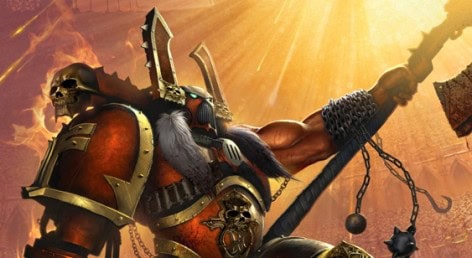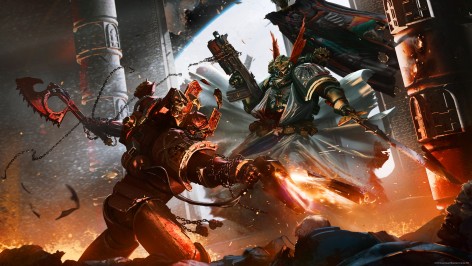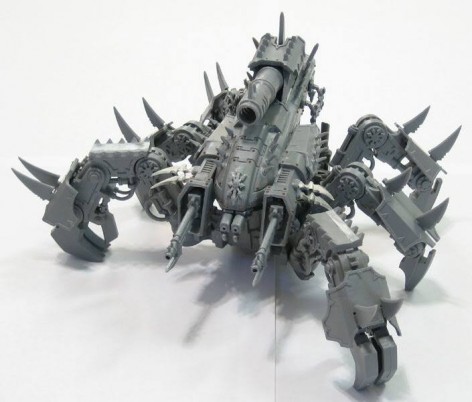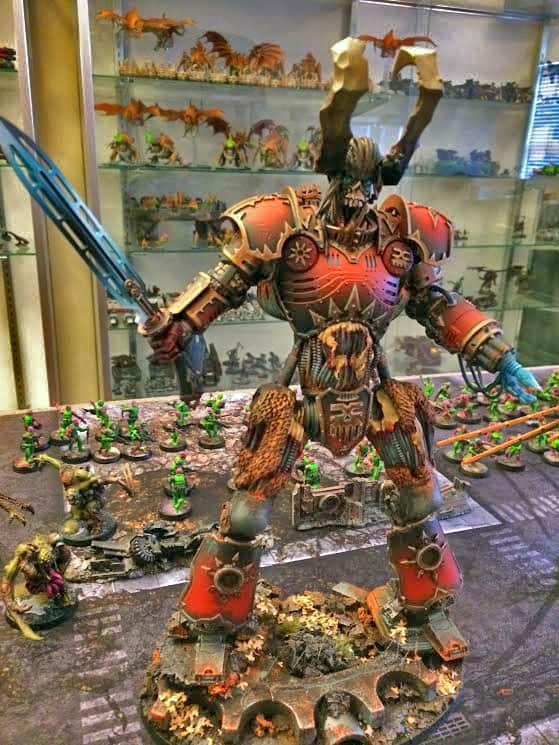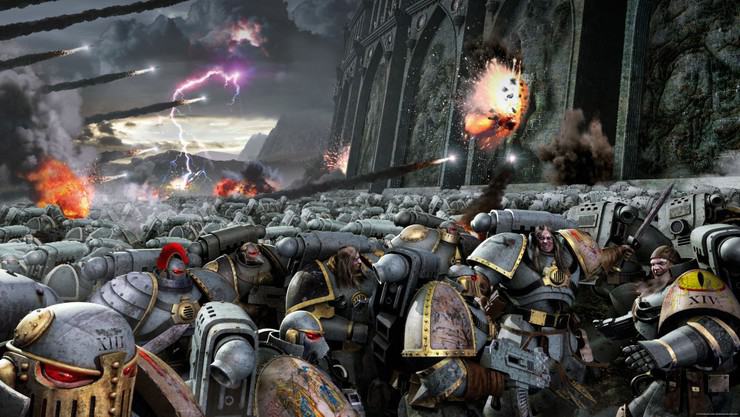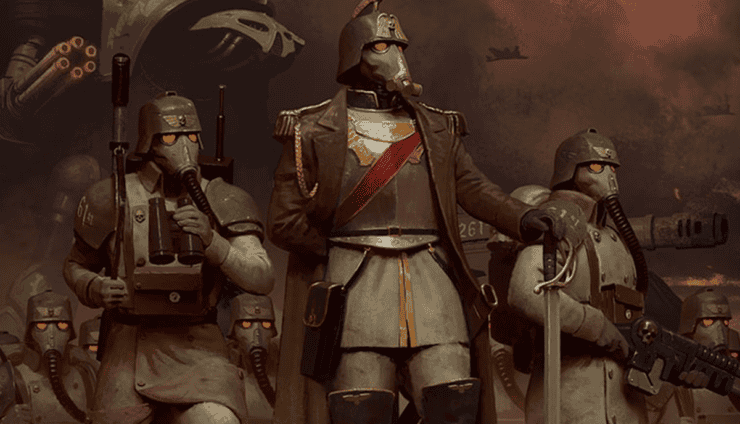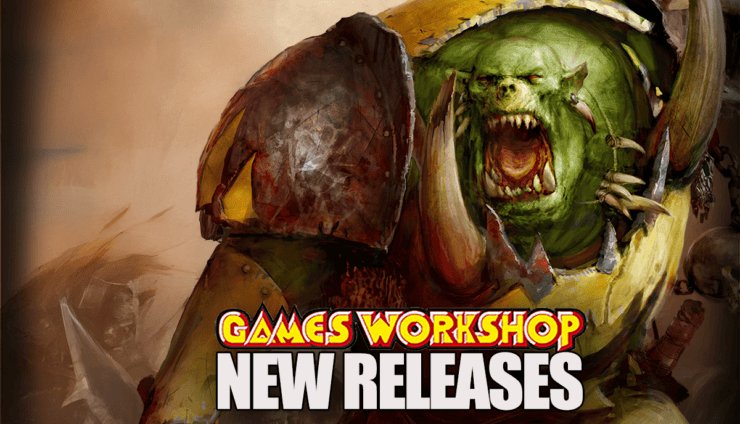Gather around Aspiring Champions of Chaos! Khorne wants you to spill blood in his name, come see how to do it BETTER!
Building a Better Bloodhost Part II: The Warmachine Detachment
Welcome to part II of the ongoing series of Building a better Bloodhost, the series that strives to showcase the true power of the Khorne Daemonkin Detachment. We previously covered the core choice of the Slaughtercult and today will be talking about the Warmachine Detachment.
The Warmachine Detachment is an Auxillary choice in the Bloodhost, and like all auxillary choices you have up to 8 slots to use them in any combination. So, if you want to, you can have up to 8 Warmachine Detachments in a Bloodhost. A Warmachine Detachment consists of any of the following units: Soulgrinder, Helbrute, Forgefiend, Maulerfiend, Defiler, or Lord of Skulls. I was really hoping the Land Raider would have made the list, but alas, it did not. Let’s look at each of these units and see how they fit into the Bloodhost. Keep in mind, you can have between 1 and 8 of these in a Bloodhost, so there is a tremendous amount of flexibility here.
Soulgrinder: The soulgrinder is a solid addition to any KDK army. The warmachine detachment is a great way to throw in a soulgrinder or 2, or maybe even 3! If you do much more than that you may want to ask yourself why you aren’t using the Helforged Hunting Pack…anyway, there is essentially no bad number of soulgrinders in an army.
My recommendation: 0-3 in a balanced KDK list. 6-8 in a Mechanized-Monster-Mash list.
Helbrute: The helbrute. Like a dreadnought, but not quite as good. That being said, these guys cannot be disregarded in a KDK army. The bloodpoint system and a low points cost means they have a place. I have had a handful of games where these guys really shined, but usually they are a little lackluster. They do fit well into an MSU build however can be made to work in the right list. I also think running 8 of these would be truly awesome, if not the most competitive.
My recommendation: 0-1 in a balanced KDK list. 6-8 in a dreadnought-party list of awesomeness
Forgefiend: The forgefiend is an interesting choice. It fills a unique role in the daemonkin army: a shooty unit that can earn bloodpoints. However, it does so at a very high points cost. Nearly 200 points for an AV12 walker with BS3 is pretty steep. That being said, if enough of these open fire on the enemy in the early turns of the game, the bloodpoints they generate could change the course of the battle. So, I see the forgefiend as a unit that you either go big with, or go home.
My recommendation: 0-1 in a balanced KDK list. 5-8 in a shooty KDK list designed to earn bloodpoints at range.
Maulerfiend: The maulerfiend is a unit that seems like it was specifically designed for KDK. It is fast, deadly, and really adds to any assault oriented army. This is another unit that in mass numbers may be better in the Hellforged Hunting pack formation, but I think is a great addition to KDK.
My recommendation: 0-4 in a balanced KDK list, 6-8 in a mechanized-Monster-Mash list
Defiler: The Defiler was once the terror of the tabletop, but alas, much has changed since then. It is a walker of very high cost that is unfortunately worse than the soulgrinder in every possible way. I really don’t understand why it is so expensive. If these things were costed as they were back in 4-5th edition then they would see a lot more play. That being said, the defiler can do something that nothing else in the KDK army can: shoot the enemy from up to 72 inches away with its battlecannon. This tactical ability cannot be overlooked, and means that in some lists I can see the defiler playing a part.
My recommendation: 0-1, as they are just so expensive.
Lord of Skulls: It may or may not be a misprint, but the Lord of Skulls can be taken as both an auxillary choice and a command choice in KDK. Meaning that if you played a large enough game, 1 core choice in the bloodhost would unlock up to 9 Lords of Skulls in the detachment. While that would no doubt make for a fun APOCALYPSE game, it is nowhere close to standard size. The Lord of Skulls brings an incredible amount of firepower to the table and can be used to generate tons of bloodpoints, but with the lack of the stomp special rule it can easily be bogged down by horde units. With the right support from KDK however, this can be mitigated and I think the Lord of Skulls could be quite good in a bloodhost. It is of course susceptible to strength D-shooting and super anti-tank armies but with 9 hull points it can take a lot of damage before it is laid low.
My recommendation: 0-1. If you use the Lord of skulls, the rest of your army absolutely must be built to support it.
Special Option, the Kytan Daemon Engine of Khorne: Depending on if your group allows experimental rules from Forge World, the Warmachine Detachment has one more option available to it, and that is the Kytan Daemon Engine of Khorne. Its rules state that “it may be selected instead of a Lord of skulls in any Detachment where such a warmachine is available” and in a KDK army it gains the Blood for the Blood God! Special rule. The Kytan is an incredible addition to a KDK army, and when using a Warmachine Detachment you can have up to 8!!! The Kytan is a truly powerful unit, and while a little expensive in my opinion, it is like a Close combat Knight on khornate steroids. If you have not seen the rules, they are available for free on Forge World’s website and I recommend you download them!
My recommendation: 0-1 for a balanced KDK list, 2 or more for pure Khorne awesomeness.
Overall, the warmachine detachment is a great way to add some hard hitting vehicles to your Bloodhost, or turn your army into a completely daemon-engine mecha-machine. The choice is yours.
The most important thing to remember about KDK is that it is all about combos. No one unit is bad if it helps other units succeed.
Until next time!
